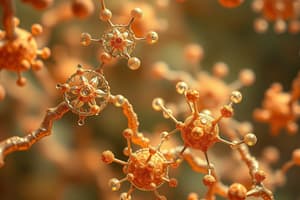Podcast
Questions and Answers
Which type of metabolite is directly involved in normal growth?
Which type of metabolite is directly involved in normal growth?
What is the main difference between bacteria and archaea?
What is the main difference between bacteria and archaea?
Which organelles are characteristic of eukaryotic organisms?
Which organelles are characteristic of eukaryotic organisms?
What does entropy measure in a system?
What does entropy measure in a system?
What does the free-energy change, $\Delta G$, indicate about a chemical reaction?
What does the free-energy change, $\Delta G$, indicate about a chemical reaction?
In which type of reaction do the products have higher free energy than the reactants?
In which type of reaction do the products have higher free energy than the reactants?
Which enzyme catalyzes the hydrolysis of peptide bonds with a serine residue in the active site?
Which enzyme catalyzes the hydrolysis of peptide bonds with a serine residue in the active site?
What is the function of a zymogen?
What is the function of a zymogen?
What type of molecule is involved in platelet aggregation and vasoconstriction?
What type of molecule is involved in platelet aggregation and vasoconstriction?
Which blood clotting pathway is activated by external trauma leading to blood leakage?
Which blood clotting pathway is activated by external trauma leading to blood leakage?
What is the role of a transition-state analog in enzymology?
What is the role of a transition-state analog in enzymology?
What is the function of a regulatory cascade?
What is the function of a regulatory cascade?
What technique is used to separate charged molecules and includes techniques such as sodium dodecyl sulfate (SDS) and isoelectric focusing?
What technique is used to separate charged molecules and includes techniques such as sodium dodecyl sulfate (SDS) and isoelectric focusing?
Which technique is used to measure the mass/charge of molecules and provides information about their composition and structure?
Which technique is used to measure the mass/charge of molecules and provides information about their composition and structure?
What refers to the entire set of proteins expressed by a genome, cell, tissue, or organism under specific conditions?
What refers to the entire set of proteins expressed by a genome, cell, tissue, or organism under specific conditions?
Which type of proteins have elongated, thread-like structures?
Which type of proteins have elongated, thread-like structures?
What is the repository of 3D structural data of biological macromolecules?
What is the repository of 3D structural data of biological macromolecules?
Which proteins assist in the proper folding of other proteins?
Which proteins assist in the proper folding of other proteins?
What is the method used for determining the atomic structure of a crystal by analyzing X-ray diffraction patterns?
What is the method used for determining the atomic structure of a crystal by analyzing X-ray diffraction patterns?
What is the turnover number in enzyme kinetics?
What is the turnover number in enzyme kinetics?
What are the standard conditions for free-energy change (∆G°)?
What are the standard conditions for free-energy change (∆G°)?
What do irreversible inhibitors do to enzymes?
What do irreversible inhibitors do to enzymes?
What is the main difference between catabolism and anabolism?
What is the main difference between catabolism and anabolism?
What is the function of ligands in relation to proteins?
What is the function of ligands in relation to proteins?
What does metabolism encompass?
What does metabolism encompass?
What is the role of T lymphocytes (T cells) in the immune system?
What is the role of T lymphocytes (T cells) in the immune system?
What do constitutive genes do?
What do constitutive genes do?
Which technique is used for studying the structure and dynamics of molecules in solution?
Which technique is used for studying the structure and dynamics of molecules in solution?
What are hydrogen bonds?
What are hydrogen bonds?
What does the Henderson-Hasselbalch equation relate?
What does the Henderson-Hasselbalch equation relate?
Flashcards are hidden until you start studying
Study Notes
Biochemistry Key Concepts
- Standard conditions for free-energy change (∆G°) include 298K, 25C, 1 bar, and 1 mole.
- Catabolism involves the breakdown of molecules and releases energy, while anabolism requires energy for the synthesis of molecules.
- Metabolism encompasses all reactions occurring in an organism, combining catabolism and anabolism.
- Systems Biology focuses on studying biological systems as networks rather than isolated components.
- Constitutive genes are transcribed at a constant level regardless of conditions or needs, while housekeeping genes maintain basic cellular functions.
- Hydrogen bonds are non-covalent interactions between a hydrogen atom and an electronegative atom (usually oxygen, nitrogen, or fluorine).
- The hydrophobic effect describes the aggregation of nonpolar substances in aqueous environments to minimize contact with water.
- Osmolarity refers to the concentration of solute particles in a solution and influences the movement of water.
- The equilibrium constant (Keq) is the ratio of product to reactant concentrations at equilibrium, determining whether a reaction favors products.
- The Henderson-Hasselbalch equation relates pH to pKa and is used to estimate the pH of a buffer solution.
- Amino acids are the building blocks of proteins, consisting of an amino group, carboxyl group, hydrogen atom, and R group.
- Peptide bonds are formed via dehydration/condensation reactions between the carboxyl and amino groups, releasing water.
Studying That Suits You
Use AI to generate personalized quizzes and flashcards to suit your learning preferences.



